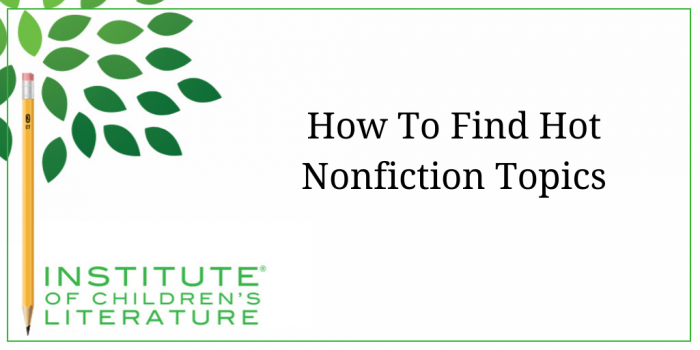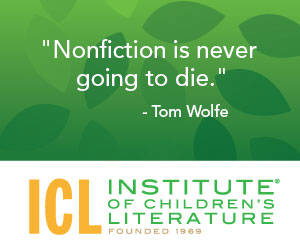1000 N. West Street #1200, Wilmington, DE 19801
© 2024 Direct Learning Systems, Inc. All rights reserved.

Overall, if you want to write in an area that has the widest array of openings, especially for new writers, the way to go is nonfiction. More publishers (both magazine and book publishers) publish nonfiction than fiction. Nonfiction is the favorite read for many elementary-aged children (a preference which often continues into adulthood), and the skills that a writers acquires while crafting nonfiction (research, organization, focus) carry over into improving fiction writing as well. So in virtually every way, nonfiction is worth an author’s time to investigate. But how do you decide what to write about? And how do you know if the topic will be of interest to publishers? And where can you find hot nonfiction topics?

But that still doesn’t address topics. You’re writing for younger readers, so what should you write about?
If you want to know what kinds of broad topics appeal to elementary aged kids, the best sources are educational publishers. Educational publishers sink or swim based on two things: (1) meeting educational standards and (2) appealing to reluctant readers. So educational fiction focuses on the topics that interest elementary readers and interest elementary educators. Educational publishers like Capstone, Amicus, and Black Rabbit are easy to find online and often showcase their titles on their website. Even publishers who don’t accept submissions can help you understand which topics are most interesting to kids, if you take some time to research their product lines.
So what types and topics do book and magazine publishers love?
One of the most popular types of nonfiction topics for both book publishers and magazines is true stories about a specific event or person, especially stories that have been overlooked. So stories of lesser known scientists or activists or historical figures are popular. So are seldom told stories of well-known historical figures or events. These narrative nonfiction stories will include facts about the time or the situation, but will primarily be focused on telling the tale. For example, in my article “Race for the Pole,” (a narrative nonfiction piece about an expedition to reach the North Pole for the first time) I included facts to let the reader understand how brutal the conditions were, but I also pulled out lesser known figures like the Inuits who really made the race to the pole possible and Matthew Henson, the black adventurer whose story was virtually ignored by historical accounts and tried to draw attention to their stories. Ultimately the article was published in Highlights.
If you enjoy telling stories, then you’ll find topics all around you. I learned about Matthew Henson while visiting a maritime museum that had an exhibit about him, but I could have picked from a number of people being showcased at the museum. Museums that are focused on history are excellent places to discover topics. They rarely go deeply into the topic in any given exhibit, but they’ll give you enough information to get you started. After seeing the museum exhibit on Matthew Henson, I tracked down copies of his autobiography and a biography of him, as well as discovering primary documents available as scans online of journals written during the expedition.
Also, look at the history in your own community. Likely you’ll find research opportunities in local historical societies or even your local library. Within local stories sometimes hide the unique contribution of individuals that brought about larger change. For instance, a local architect may have begun a movement. Or a local building could be the sole example in your state of the work of a famous architect, so what made that person build that building there? The more you research, the more you’ll find yourself asking bigger questions that may point toward a good story.
If historical nonfiction isn’t your thing, consider looking into your own community for subjects. Are any young people being honored for their contribution to the community? If so, look into the details of what the person did. If the young person’s contribution was innovative or unique in some way, a narrative nonfiction piece on that person may be an excellent choice for a magazine nonfiction piece. [Book nonfiction generally looks for something more timeless, so unless the young person has garnered a lot of media attention or done something truly astounding and groundbreaking, it might be better to focus on magazine publication for local kid stories rather than attempting a book focused on the child.]
Another element of looking within your own community is in telling a story that only you can tell. Own voices stories that bring to light true stories that would have been dismissed or overlooked, can help young people expand their understanding of the world and the people in it. Publishers are specifically looking for that right now.
As popular as narrative nonfiction is with young readers, expository nonfiction (the nonfiction of facts and information) is represented by even more books. Educational publishers particularly produce huge numbers of nonfiction books designed to interest young reader, but also to potentially be research material for young people writing reports for school. Again, educational publisher websites and catalogs can help you see what topics are of greatest interest.
Animals, of course, are of endless fascination to kids, but animal nonfiction is also the number one most submitted nonfiction for nearly all magazines and many nonfiction publishers. To make animal nonfiction work for publishers, you often have to be writing about the animal plus something else. For instance, books exist that focus on unique animal noses, because this combines both animals (which kids love), senses (which is an elementary school topic), and weirdness. Kids love weirdness. This is why you’ll see so many nonfiction books with titles like Extreme Environments or Extreme Predators or Extreme Animal Builders. Books like this trade on children’s fascination with new and unusual creatures (or phenomena, since you’ll also see titles like When Weather Attacks or Ultimate Disasters or other such pumping up of unusual phenomena.
As much as kids love animals, they also love technology. Nearly every educational publisher has titles about robots, titles about new technology, titles about software (coding is a popular topic, though it can be more how-to than expository). You’ll also see titles that merge younger readers interest in vehicles and community helpers, so you’ll see titles focusing on specialized police vehicles, or fire trucks.
Many publishers list earth science frequently in their submissions guidelines and even single out their interest in the topic, but you’ll see their published line doesn’t seem to have many earth science books. This is often more a matter of what they receive, rather than a reflection of what they want. Earth science (geology, oceanography, meteorology, astronomy) nonfiction is wide open to writers willing to find an interesting topic within. And new information pops up every day. For example, in 2020 researchers studying earthquakes discovered that their earthquake sensors were affected by the Northern Lights. This produced new areas of study and new questions, but would also fascinate kids who would never have guessed that pretty colors in the sky could affect how much the earth trembles.
So how did I discover that the northern lights trigger earthquake sensors? I started with a submissions guideline asking for earth science topics. I hadn’t really written earth science pieces (as I’m a huge fan of robots so when asked to do nonfiction, I often turn to what’s happening in robotics). But the guideline mentioned “earth science” I wanted to know if there might be anything interesting to me out there. I turned to a web search. First I simply typed in “earth science” and “topics” because I wanted to know what sorts of things fell under the huge umbrella. I poked around and clicked and followed interesting sounding trails until I saw something on the northern lights. I love photos of the northern lights and have never seen them in real life so I found myself wandering in that direction during my link clicking. At this point, I was simply following trails that looked interesting and ignoring those that did not.
I began reading about what the northern lights is and what causes the phenomenon. And I began looking into how much science actually knows about the northern lights. I read about legends linked to the northern lights, since I do like a good legend. But while I was poking around, I learned about how astonished researchers were to find earthquake sensors reacted to the northern lights. Researchers aren’t sure what’s going on, but I was fascinated. This was a brand new discovery. Anytime you find something new, you’re in a realm of information that a publisher doesn’t receive every day. Did I have to do a bit of wandering to discover it? Sure. But it was fascinating. That’s the real key to nonfiction success. Follow the paths that interest you and turn away from the ones that do not. Could a story that would interest a publisher be found down a dull path? Sure, but you’re not the one to write it. Leave that for the writers who find that path interesting and absorbing because they’ll be the ones who can do justice to the topic. Your topics will be the ones that capture your interest.
Don’t get stuck in the rut of just writing about the things you know (your dog, your garden, your hobbies), only to find publishers get so many submissions on those topics that yours simply cannot stand out. Instead seek out new things. Release your inner little kid who can latch onto something new and hunger to learn every single thing about it. Then take that kid on a web search to find brand new things. Don’t be afraid to check out broad subjects you hadn’t considered (as I said, I was really starting at the very basics in my search for earth science topics) and dig deeper and deeper. Follow the twisting paths of information that sounds interesting until you hit that “Ah-ha! This is new and interesting!” At that point, dig in, learn all you can, and write your piece. Your temporary passion may just signal your next publication win.
With over 100 books in publication, Jan Fields writes both chapter books for children and mystery novels for adults. She’s also known for a variety of experiences teaching writing, from one session SCBWI events to lengthier Highlights Foundation workshops to these blog posts for the Institute of Children’s Literature. As a former ICL instructor, Jan enjoys equipping writers for success in whatever way she can.
1000 N. West Street #1200, Wilmington, DE 19801
© 2024 Direct Learning Systems, Inc. All rights reserved.
1000 N. West Street #1200, Wilmington, DE 19801
© 2024 Direct Learning Systems, Inc. All rights reserved.
1000 N. West Street #1200, Wilmington, DE 19801
© 2024 Direct Learning Systems, Inc. All rights reserved.
1 Comment